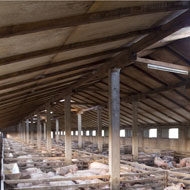Review calls for reduction of antibiotics in agriculture

The review calls for a global target to reduce antibiotic use in livestock.
The use of antibiotics in agriculture is encouraging antibiotic resistance and must be reduced, according to a new review commissioned by the government.
Countries or areas that use more antibiotics often have higher rates of resistant bacteria, meaning infections are harder to treat. It is also evident that use of antibiotics in animals is associated with the development of resistant bacteria, as in human use of antibiotics.
The latest review, Antimicrobials in Agriculture and the Environment: reducing unnecessary use and waste, calls for a global target to reduce antibiotic use in livestock.
It states: "We think the best way to reduce overall antibiotic use is to establish targets or limits for antibiotic use in agriculture and aquaculture, to an agreed limit for each country, whilst allowing individual countries to work out the best way to meet their goals.
"An ambitious, but achievable, and appropriately enforced target could secure a global reduction in use, while allowing individual countries flexibility to decide how to reach those reductions."
Some 25,000 people in Europe die every year from antibiotic-resistant infections and no new classes of antibiotics have come onto the market for more than 25 years.
The independent review was commissioned by Prime Minister David Cameron to examine why so few new antibiotics have been introduced in recent years. Led by the internationally respected economist Jim O'Neill, it is co-funded and hosted by the Wellcome Trust - the world's second largest medical research foundation.
In response to this latest paper, BVA president Sean Wensley said: "BVA is opposed to the introduction of arbitrary, non-evidence based target setting; such targets, to reduce antibiotic use, risk restricting vets' ability to treat disease outbreaks in livestock, which could have serious public health and animal welfare implications.
"The current EU legislation onsets' prescribing of antibiotics for all animals, included those intended for production, is robust and we would like to see equivalent legislation rolled out globally."
The National Office of Animal Health (NOAH) have also responded to the review, warning that applying antibiotic standards may not be workable.
While welcoming the review, NOAH chair Catherine Sawyer says that farmers and veterinary surgeons in the UK already use antibiotics responsibly - "as little as possible, but often as necessary".
She adds "In the UK, organisations such as RUMA (Responsible Use of Medicines in Agriculture) are already making practical steps towards reducing antibiotic use, by setting out responsible use guidelines which aim to reduce the need for antibiotics through biosecurity, vaccination and other animal husbandry measures where possible.
"However, we must remember that animal species types, husbandry practices and climate conditions vary around the world. Any proposals to apply standards from, for example, Denmark to other parts of the EU and the world, may not be workable."



 The Veterinary Medicines Directorate (VMD) is inviting applications from veterinary students to attend a one-week extramural studies (EMS) placement in July 2026.
The Veterinary Medicines Directorate (VMD) is inviting applications from veterinary students to attend a one-week extramural studies (EMS) placement in July 2026.